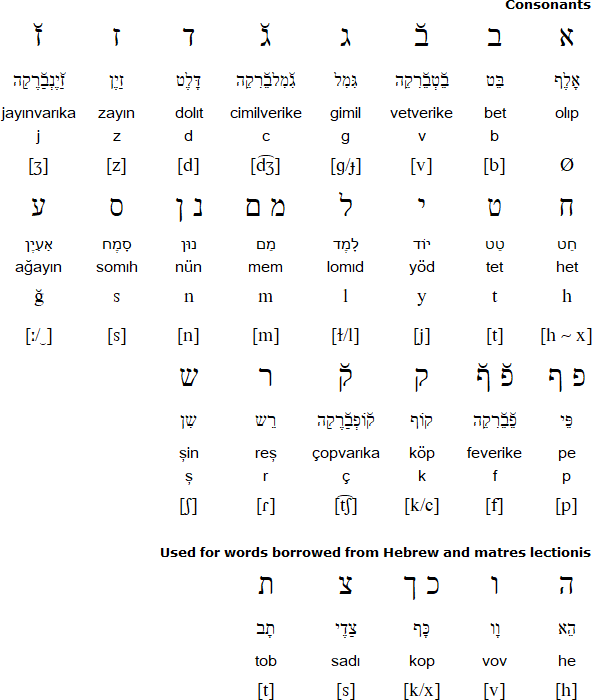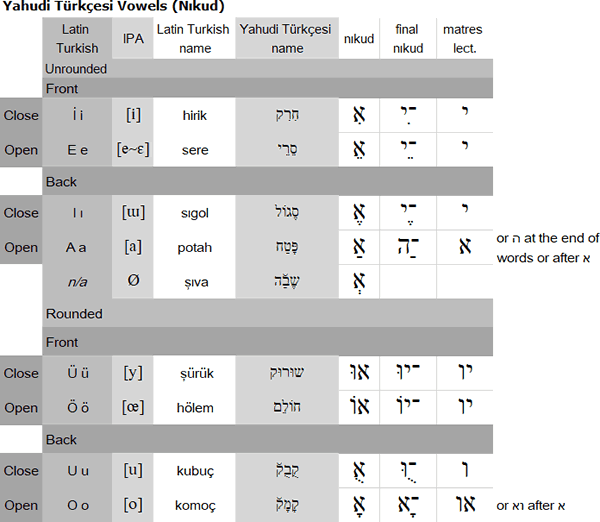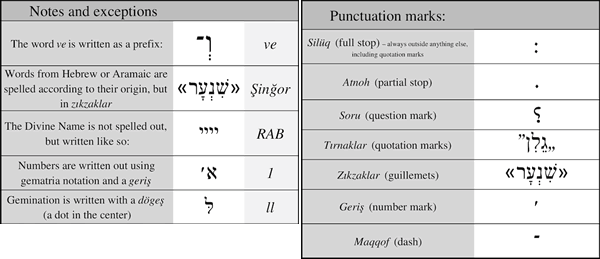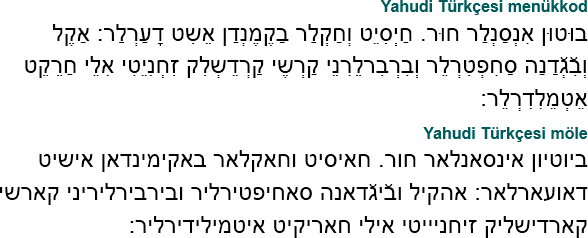Yahudi Türkçesi is a way to write Turkish with the Hebrew abjad developed by Isaac Mayer. The Turkish language has been written in many different alphabets, from Ottoman Arabic to Soviet Cyrillic to the standard Latin of today, but very few texts are known that write Turkish in Hebrew. There has been a Jewish community in Turkey for thousands of years - longer than there has been a Turkish community there, in fact! So why not develop a standardized system to write Turkish in Hebrew?
Yahudi Türkçesi, which literally means "Jewish Turkish," is written using the Hebrew abjad, and like many abjads it has both a vocalized and an unvocalized form. The unvocalized (or möle – from the Hebrew "full") form has heavy usage of matres lectionis - consonantal letters that stand in for vowel sounds without representing them directly - whereas the vocalized (or menükkod – from the Hebrew for "dotted") form does not use them.
Much of Yahudi Türkçesi's orthography was based on the orthography of Ladino (also known as Dzhudezmo or Judeo-Spanish), because since the 15th century the Jewish community of Turkey has been dominated by Ladino speakers of Spanish origin. The usage of the háček-shaped "varika" marker to modify the sounds of the letters ב, ג, ז, פ, and ק is taken directly from traditional Ladino orthography, as well as the regular usage of א, י, ו, and ה as matres lectionis in möle form. And just as Ladino uses Hebrew orthography for Hebrew words instead of naturalizing the spelling, leading to a number of letters only in use for Hebrew borrowed terms, so too does Yahudi Türkçesi.
The vowel sounds are partially based on the Yemenite system, one of the only Hebrew dialects with regular use of umlauted vowels. Thus, in the menükkod form אָ is equivalent to o, and וֹ is equivalent to ö. The use of אֶ for ı, though, is based on some Yiddish dialects, since the sound doesn't have a Hebrew equivalent in the region.
Since Turkish has a strong vowel harmony system, some of the terms for Hebrew letters and markings have been altered. The "varika" marker, for instance, is called "varıka" or "verike" depending on what letter it follows. And certain consonants' names have been harmonized as well – "gimil" rather than "gimıl" and "zayın" rather than "zayin."



Download an alphabet chart for Yahudi Türkçesi (Excel)

Bütün insanlar hür, haysiyet ve haklar bakımından eşit doğarlar. Akıl ve vicdana sahiptirler ve birbirlerine karşı kardeşlik zihniyeti ile hareket etmelidirler.
All human beings are born free and equal in dignity and rights. They
are endowed with reason and conscience and should act towards one another
in a spirit of brotherhood.
(Article 1 of the Universal Declaration of Human Rights)
Tower of Babel in Yahudi Türkçesi
Information about Turkish | Phrases | Numbers | Family words | Time | Tongue twisters | Tower of Babel | Hurûf-ı munfasıla | Books about Turkish on: Amazon.com and Amazon.co.uk [affilate links]
- TurkishClass101.com - Learn Turkish with Free Audio and Video Lessons
- Learn Turkish online with Mondly
- Learn Turkish with Glossika
Ajalaptlajkuilolistli, Čveneburuli / Judeo-Georgian, Grekoiberieraren Alfabeto Berria, Hágrít Nyelv, Inglith, iŋliʃ fidæl, nā hōʻailona ʻōlelo, Pikchukunap Qillqa, Ṣəḥəfätä Ǝsəraelawi, Tianjinjiao, Yahudi Türkçesi, Yūdu lipi
Constructed scripts for: Ainu | Arabic | Chinese languages | Dutch | English | Hawaiian | Hungarian | Japanese | Korean | Lingala | Malay & Indonesian | Persian | Tagalog / Filipino | Russian | Sanskrit | Spanish | Taino | Turkish | Vietnamese | Welsh | Other natural languages | Colour-based scripts | Tactile scripts | Phonetic/universal scripts | Constructed scripts for constructed languages | Adaptations of existing alphabets | Fictional alphabets | Magical alphabets | A-Z index | How to submit a constructed script
[top]
You can support this site by Buying Me A Coffee, and if you like what you see on this page, you can use the buttons below to share it with people you know.

If you like this site and find it useful, you can support it by making a donation via PayPal or Patreon, or by contributing in other ways. Omniglot is how I make my living.
Note: all links on this site to Amazon.com, Amazon.co.uk
and Amazon.fr
are affiliate links. This means I earn a commission if you click on any of them and buy something. So by clicking on these links you can help to support this site.
[top]